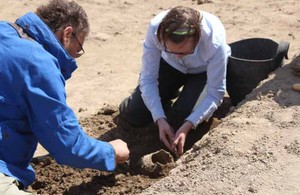Iraq's unique heritage attracts British researchers
The first return of British archaeologists to Iraq since the 1990s

Iraq's Heritage attracts British researchers photo
A new project to unearth Iraq’s rich history began this month when a combined team of British and Iraqi archaeologists started excavations at a four thousand-year-old town in Thi Qar province, southern Iraq, near to the famous city of Ur. The project marks the first return of British archaeologists to Iraq since the 1990s. Project co-director Dr Jane Moon is looking forward to working closely with her Iraqi colleagues: “Iraq has an excellent record of producing first class archaeologists,” she said, “we want to build on that and combine it with the best of international practice.”
The six-strong British component of the team is based at the University of Manchester while Iraqi team members include three recent graduates who are now employed by State Board for Antiquities and Heritage. Professor Stuart Campbell, Head of the Department of Archaeology at Manchester University and also a co-director of the project, sees the project as being an important first step towards developing wider cooperation in archaeology and heritage management between British and Iraqi universities. “This year has been very much about setting up the project and getting going,” he said, “but I hope in future to build close links with the local universities in Nasiriyah and Diwaniyah – they are such an important local resource.”
The project is currently supported by the British Institute for the Study of Iraq, the British FCO, and by companies and private individuals with an interest in building capacity in heritage expertise in Iraq. It aims to run annual field seasons over the next seven years, with accompanying research and publication.
Dhi Qar has a very rich archaeological heritage, but international experts have been excluded from the Ur area for decades because of sensitivity over the nearby air-base. The city of Ur was excavated for the British and Pennsylvania Museums in the 1920s and 1930s, by Sir Leonard Woolley. Finds from its spectacular ‘Royal Tombs’ were among the first to be deposited in the Iraq Museum, set up by Gertrude Bell. The new British-Iraqi team is not looking for fine objects, however, but for information about the world’s first civilization, and for an opportunity to start a new chapter in the exploration of Iraq’s incomparable ancient heritage.